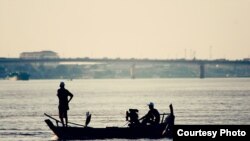Advocacy groups, environmentalists and policy-makers have wrapped up five days of events surrounding Mekong River issues in Washington.
“Mekong Days,” a series of talks, films and other forums that ended Tuesday, highlighted issues in the region, where some 60 million people live.
The Mekong River, a major source of food for many in the region, is currently under increased pressure from hydropower dam projects and the potential impact of climate change. Environmental advocates say the dams could hurt fish stocks in the river, even as temperature and rainfall changes threaten agriculture and livestock.
But with the US diplomatic focus returning to Asia, the Mekong River could become even more important, advocates say. A recent study funded by USAID, “Mekong Adaptation and Resilience to Climate Change,” found increasing threats to livestock, fisheries and other agriculture.
All of this makes Washington a good place to discuss the Mekong, said Wilfried Eckstein, director of the Goethe Institute, which helped organize the events. Washington has many foundations that are active and experienced in Southeast Asia, and they can move opinion and policies, he said.
“So I think the Goethe Institute can contribute as a platform to communication about what is going on in the world, first of all, and in this case that is the Mekong River basin in particular,” he said.
More than 100 participants took part in the Mekong Days events, which were supported by US and European organizations.
Vathny Say, a Maryland resident who attended a film screening, said Washington was the right place for such discussions. “There are a lot of policymakers and influential people that can speak to the government about the issues,” she said. This helps people get a better understanding of people who live along the river, often at subsistence levels, and how they are impacted by developments, including dams, she said.
She would have liked more information on Cambodia, however, she said. “They need to consider more of the people’s needs,” she said. “If they did that, they would have less problems, but they don’t.”
Filmmaker Douglas Varchol said he produced “Mekong” to encourage dialogue on the river’s issues, which cross national borders and are often politically sensitive.
For viewers like Ellen Notar, of Washingotn, Mekong Days did just that.
“I think the film just made us more aware of the difficulties in a huge region, and so many countries involved, and the life of the Mekong is so critical to these people,” she said.
Cambodia filmmaker Chum Sophea, who produced “My River, My Fish, My Life,” told VOA Khmer by phone from Phnom Penh that he was happy to have his film screened in Washington, where it won third prize for Southeast Asia. “The Mekong is just like the blood vein of life for people who live along the Mekong River,” he said.
Kalyanee Mam, a Cambodian-American filmmaker whose documentary, “A River Changes Course,” won a Grand Jury Prize at the Sundance Film Festival this year, said the Mekong is facing a variety of threats, including hydroelectric dams, dynamite fishing methods and other overfishing.
“Our Mekong and Tonle Sap [rivers] have a lot of problems now, because the fish are getting less when they start building dams,” she said. That can be devastating for many Cambodians, who rely on river fish as a major source of protein, she said.
At least 11 dams are currently planned for the lower Mekong, a major concern for fish populations that migrate up and down the river. China has built four dams upstream already, and Laos is in the process of building a dam in Xayaburi province, despite objections from Cambodian and Vietnam.
In Washington, ‘Mekong Days’ Puts River in Focus







